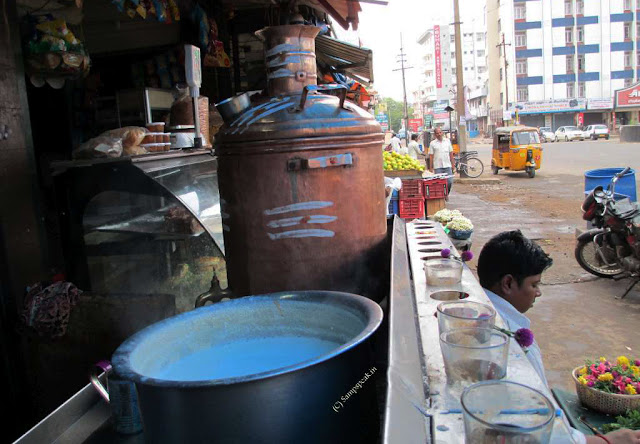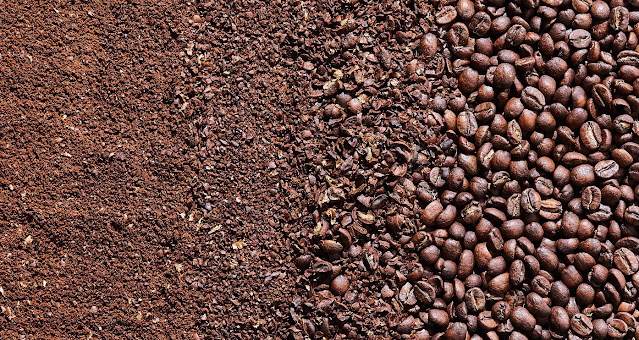As Civilization progressed, humanity
has been worried about land for living and the process of construction. There are landfills and the decomposition of
organic waste in such landfills produces methane gas, which reportedly is 21
times worse than CO2 in its global warming potential. Spent Coffee grounds (SCG) are one type of
organic waste that forms significant proportion of organic waste in landfills. Sounds not so familiar to us !!
Coffee is one of the most widely consumed drinks in the world,
with two billion cups drunk worldwide every day. South Indian coffee (a.k.a filter coffee) is a
milk coffee (perfect example of South Indians' affinity for dairy products) – a
great mixture of decoction and milk added with sugar, primarily from coffee beans and chicory. In recent past, on every highway in
Tamilnadu, shops calling themselves - original Kumbakonam filter coffee shops
have mushroomed. In South Indian culture, the visitor to a House is welcomed
and offered a tumbler of coffee. It is
an energizer !
All
coffee comes from the coffee tree (genus Coffea). The tree’s cherries are
picked and processed to gain access to the tiny seeds they contain, which are
called green coffee beans. These green coffee beans are then roasted before
being ready for consumption and are called whole coffee beans. Before being brewed however, whole coffee
beans are ground into smaller particles to extract as much flavour as possible. This is easily accomplished using a variety of tools
including electric coffee grinders, blenders, mortar and pestles, or food
processors – there were handwound grinders in early days. After being ground in
one of these devices, whole coffee beans are referred to as ‘ground coffee’.
Used
coffee grounds is the result of brewing coffee, and are the final product after
preparation of coffee. Despite having several highly-desirable chemical
components, used coffee grounds are generally regarded as waste, and they are
usually thrown away or composted. On an average,
1 tonne of green coffee produces approximately 650 kg of spent coffee grounds, and over 15 million tonnes of spent coffee
grounds are generated annually.
Today read this interesting piece in Guardian UK about an idea that fittingly arose over a cup of coffee, researchers have devised a technique to recycle used coffee grounds to make stronger concrete. Engineers at RMIT University say they have developed a way to make concrete nearly 30% stronger by incorporating processed coffee grounds into the material. The researchers have converted waste coffee grounds into biochar, a lightweight residue similar to charcoal, and used that biochar to replace a portion of the sand required to make concrete.
The
idea arose from a desire to minimise coffee waste within the workplace, said
study co-lead Dr Shannon Kilmartin-Lynch, a vice-chancellor’s Indigenous
postdoctoral research fellow at RMIT. “There was a lot of ground coffee and
coffee pods being discarded,” he said. “[We wanted] to see if we could
transform those spent coffee grounds into a more valuable sort of material.” The
researchers are now collaborating with local councils on future infrastructure
projects such as the construction of walkways and pavements.
The
technique could be environmentally beneficial if it can reduce the amount of
coffee waste going to landfill, as well as the demand for natural sand used in
the construction industry, the engineers say. Australia produces an estimated 75,000 tonnes
of coffee waste per year. The process, called pyrolysis, involves heating the
coffee waste to about 350C. The team says their technique is more energy
efficient because it requires lower than usual temperatures. By replacing 15% of the sand typically used
in concrete with coffee biochar, the researchers found that the addition
enhanced strength by 29.3%.
“It
definitely still is in its initial phase – there are further tests to be done
on the durability and things like that.” If all waste coffee grounds produced
in Australia each year were converted into biochar, it would amount to roughly
22,500 tonnes, the researchers estimate.
The research was published in the journal Journal of Cleaner Production.
With regards – S. Sampathkumar
23.8.2023.


No comments:
Post a Comment